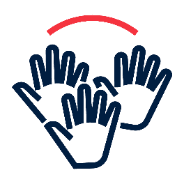FUNDAMENTAL PRINCIPLES
Our Fundamental Principles remain constant, guiding our humanitarian actions and ensuring we always work in service to communities – regardless of tribe, religion or colour. The Fundamental Principles is the basis for the Movement’s CREDIBILITY AND TRANSPARENCY. It is a universal reference, linking the Red Cross and Red Crescent (RCRC) Movement components, describing the goal, ethnics, meaning and special nature of the Movement.
The Fundamental Principles guide the practices of all those working under the Red Cross banner and are the basis upon which the RCRC Movement works. The Fundamental Principles make the beneficiaries, authorities to know how we work. The integrity and public image of the Movement depend on adherence by all to the Fundamental Principles.

HUMANITY

IMPARTIALITY

NEUTRALITY

INDEPENDENCE

VOLUNTARY SERVICE

UNITY


